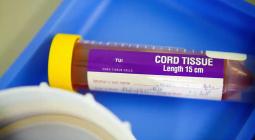PFAS: Brussels top brass found to have ‘forever chemicals’ in their bloodstream
European NGOs have tested the blood of the EU’s political top brass and found several banned “forever chemicals”, upping the pressure on Brussels to put the bloc’s chemical regulation back on the agenda.
Awareness of PFAS [per- and poly-fluoroalkyl substances], where products leak “forever chemicals” into the environment, is on the rise. Yet, the European Union quietly shelved a much-needed reform of its chemical regulation REACH in October.
Now, civil society groups are resorting to a favoured method of raising awareness: getting high-level politicians to test their blood for chemicals.
“I took a blood test to check the possible presence of toxic chemicals in my blood … Seven of the 13 PFAS analysed were found in my blood,” said the European Commission’s Executive Vice-President Margrethe Vestager.
The Danish politician is one of many high-level testimonials put forward in the PR stunt orchestrated by the European Environmental Bureau and ChemSec.
“Toxic forever chemicals are everywhere. They invade our environment, home-grown vegetables, fish, and our bodies, where they persist forever,” said Frans Timmermans, formerly the bloc’s Green Deal chief who since went back to Dutch politics.
Other commissioners getting their blood tested include Virginijus Sinkevičius, in charge of the environment, and Dubravka Šuica, who handles the democracy portfolio. Several EU lawmakers submitted blood samples as well, making for a regionally diverse sample set.
The NGOs looked for 13 different “forever chemicals” and found at least seven, including PFOA, PFOS, and PFHpS. The first two are banned, while the other is entirely legal. Other chemicals found are approved for regulated uses.
But the activists pointed out that the EU chemical regulatory framework suffers from a key deficiency: it is too business-friendly. While medical companies must prove that their products are harmless, chemical companies are not subjected to similar requirements.
Instead, it is up to regulators to prove that commonly used chemicals are harmful to humans – a rather costly process that can take years. When a chemical is finally banned, the clean-up cost is often borne by society rather than the companies.
“It is intolerable that substances that have been proven to be harmful to health and the environment have been allowed to be used legally for decades,” said Jutta Paulus, a green lawmaker from Germany whose blood has also been tested.
Her body contained the banned substances PFOA and PFOS, as well as the fully legal PFHxS, at above the reporting threshold “but below the warning threshold,” she told Euractiv.
Ultimately, she argued, the EU framework needs to be changed. “We must reform REACH so that the social costs are finally borne by the polluters.”
Dutch centre-left S&D lawmaker Mohammed Chahim echoed her sentiment. “We need to open up the REACH legislation and make sure that these types of chemicals are better legislated,” he said.
Cefic, the chemical industry association, said that it “understands the questions and worries that arise” from PFAS found in blood tests, stressing that it supports “a balanced regulatory action on these substances”.
The association explained that its priority was “regulatory actions that bring the most benefits to health and environment” while “keeping the regulatory framework as stable as possible and maintaining the coherence of REACH with all other pieces of EU legislation”.
But the ongoing effort on “the universal restriction proposal submitted in February 2023” does “not need the Reach revision”, it added.
This is not the first time NGOs have tested blood for chemicals to score political points. According to the Euractiv archives, in 2004 the WWF already found some chemicals in the blood of EU lawmakers.
Belgium at the helm
The issue is a major concern for Belgium, which currently holds the rotating EU Council Presidency. Big chemical companies like the 3M conglomerate, which manufactures their products near the port of Antwerp, have been found to contaminate the ground with PFAS, thereby polluting their neighbours’ blood.
Investigative research revealed that of all European countries, Belgium was the most PFAS-contaminated, perhaps even in the world, experts speculate.
On Thursday (1 February), the Belgian presidency is hosting an event on tackling PFAS. Agenda items include “phasing out of PFAS and products containing PFAS” and expertise-sharing on “monitoring and minimizing the spread of pollution and exposure to the population.”
Cover photo: A PR stunt by European NGOs found several "forever chemicals" in the bloodstreams of the EU top brass. [EEB/ChemSec]




